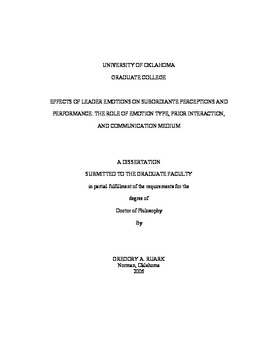| dc.contributor.advisor | Connelly, Mary Shane, | en_US |
| dc.contributor.author | Ruark, Gregory A. | en_US |
| dc.date.accessioned | 2013-08-16T12:20:24Z | |
| dc.date.available | 2013-08-16T12:20:24Z | |
| dc.date.issued | 2006 | en_US |
| dc.identifier.uri | https://hdl.handle.net/11244/1108 | |
| dc.description.abstract | The current research reports findings from 2 studies assessing the relationship of emotion type, prior leader interaction, and media richness on a leader's emotions to influence subordinate perceptions and performance. Study 1 looked at emotion type (basic vs. blended) and nature of prior leader interaction (positive vs. negative vs. neutral) on perception of negative emotions and message comprehension of negative information conveyed in a leader's e-mail. Results revealed that emotion type and prior interaction interact to influence the perception of positive emotions, where a negative prior interaction followed by negative blended emotions resulted in the most accurate perceptions. Additionally, leader blended emotions increased comprehension for emotionally laden content. Study 2 looked at the effects of emotion type and media richness (rich/video vs. lean/e-mail) on perception of positive and negative emotions, comprehension of positive and negative information, and performance on a creative task. Results showed that emotion type influenced emotion perception, where basic emotions resulted in better accuracy for negative emotions while blended emotions resulted in better accuracy for positive emotions. Also, media richness did not impact perception of positive emotions but did for negative emotions with richer communication channel resulting in better accuracy. For message comprehension, emotion type and media interact to impact understanding for negative content, where highest comprehension was seen when message included blended negative emotions and delivered through a leaner medium (e.g., e-mail). Finally, hierarchical regressions provided initial evidence that emotion type, specifically blended emotions, positively contributes to performance quality. Implications for theory and practice are explored. | en_US |
| dc.format.extent | ix, 105 leaves : | en_US |
| dc.subject | Language and emotions. | en_US |
| dc.subject | Interpersonal communication. | en_US |
| dc.subject | Communication in management. | en_US |
| dc.subject | Nonverbal communication in the workplace. | en_US |
| dc.subject | Psychology, Industrial. | en_US |
| dc.title | Effects of leader emotions on subordinate perceptions and performance: The role of emotion type, prior interaction, and communication medium. | en_US |
| dc.type | Thesis | en_US |
| dc.thesis.degree | Ph.D. | en_US |
| dc.thesis.degreeDiscipline | Department of Psychology | en_US |
| dc.note | Adviser: Mary Shane Connelly. | en_US |
| dc.note | Source: Dissertation Abstracts International, Volume: 67-10, Section: B, page: 6105. | en_US |
| ou.identifier | (UMI)AAI3238271 | en_US |
| ou.group | College of Arts and Sciences::Department of Psychology | |
